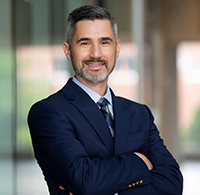A Q&A with Dean Jeffrey J. DiGiovanni

What inspired you to pursue a career/leadership role in health professions and education?
I don’t think many people grow up thinking they want to be an education leader. I certainly didn’t. But like many things, it was an evolution of my career over time. Mostly, I wanted to study sound. I always enjoyed music and knew I didn’t have the talent or inclination to pursue it as a career. I also love technology, so as computers became more capable, I enjoyed marrying sound and technology, such as audio production. With my interest in science, I ended up pursuing a combination of my interest in sound (and how we sense and process sound) with technology, which led me to a career in hearing research in the university setting. I enjoyed devising ways to answer research questions, and mentoring students in new skills. Ultimately, if a student learned how to think about a problem and appreciate the research process, I was happy. Over time, as I got increasingly involved in administrative aspects of the institution, I learned that higher education was facing massive changes, which piqued my interest. And, well, long story short, here I am.
Can you share an experience that helped shape your leadership style?
An earlier experience I had was when I was charged to develop an office of clinical affairs for a college. One of its priorities was to facilitate various aspects of clinical education. During that experience, I had the chance to hire students and staff and work closely with directors of clinical education. Individuals were across the spectrum in terms of their professional development. Through this, I learned the value of situational leadership, which allows the supervisor to adapt his/her style based on the status of the mentee. It also helped me identify my default style, so I can intentionally move from my default delegation style to more participatory and directive styles.
What is your broader vision for SHP and one specific goal you’d like to achieve?
In the broadest of terms, my vision for SHP is to take an excellent school and help navigate it to the next generation of higher education. There are several factors that are pushing up against how we have traditionally conducted the institution, such as demographic changes, technology innovation, generational culture. With the exceptional stewardship the school has enjoyed, the strong collaborative environment, and the innovative spirit, SHP is perfectly poised for this challenge. The strategic plan for which we are now engaged in developing, will serve as our polestar that establishes our trajectory for our long-term evolution. Essentially, we developed a process where we will collect a series of information from all SHP employees though surveys, discussion groups, and workshops. It will be highly iterative. For example, we are starting with a review of SHP’s mission, vision, and values. Based on the data we collect, updated statements will be developed and sent back out for review. The success of this process hinges on everyone’s participation.
How do you plan to support and enhance the professional development of faculty and staff within the school?
All SHP employees need to have the opportunity for professional development. The school is working to dedicate funds for staff to engage in external opportunities. Rutgers has been proactive in developing a wide variety of seminars and training for faculty and staff. We look to leverage those to address emerging and ongoing needs, such as learning new systems to addressing technological advances in the classroom. Finally, as we see themes where a larger number of individuals have a similar need, we will bring in training providing allowing a more custom and relevant development.
What would people be surprised to know about you?
One hobby I had that is often a surprise to people is that I used to race cars. One side effect of graduate school is needing to learn mechanic work. This served well as I upgraded the rear solid-axle and rebuilt the transmission on my track vehicle. Honestly, the car was a bit of a heap, but it was a great learning tool. I worked through the series of a high-performance driving program offered by the National Auto Sport Association (yes, NASA). I made it through the series and did some time trials, but ended up buying a house before I completed my competition license. Racing takes a great deal of time and dedicated funds. In a weekend, which was typically six 30-minute sessions, I would go through a full set of tires and brakes. And that is if nothing went wrong.
